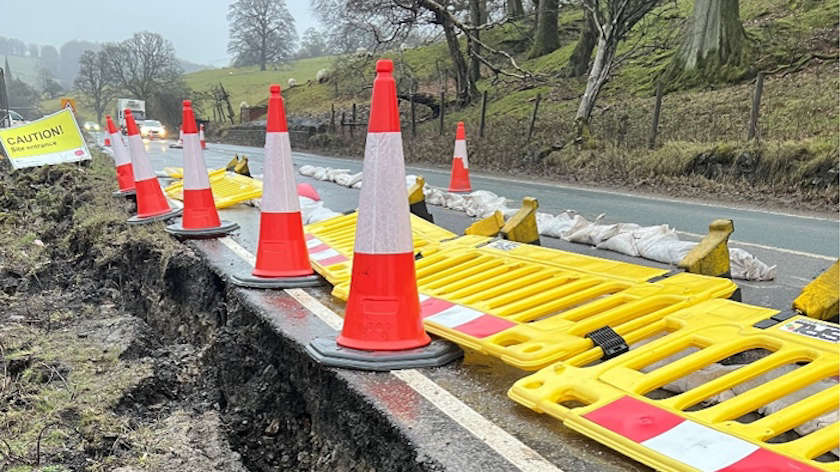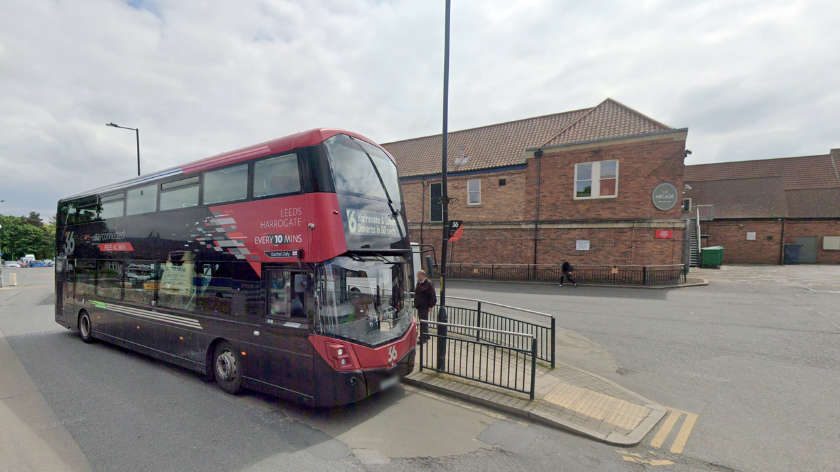
Highways bosses have issued assurances the extended closure of the A59 at Kex Gill for a further three months was caused by one of the wettest winters in a century, rather than the felling of hundreds of trees beside the route.
North Yorkshire Council’s director of environmental services Karl Battersby said while the authority’s contractors had cut down medium height silver birches close to the A59 as part of the £68.9m project to change its route at landslip-hit Kex Gill, the authority did not believe the trees removal was linked to the road cracking.
Mr Battersby was responding to concerns raised by councillors, just two weeks after the authority caused dismay by announcing the key east-west route would not reopen before the end of June to complete £750,000 of repairs.
The road between Skipton and Blubberhouses has been closed since February 2, leading to heavy congestion on the diversion route through Otley and Ilkley and some businesses losing thousands of pounds of trade every week.
Glusburn, Cross Hills and Sutton-in-Craven division councillor Philip Barratt told a meeting of the council’s transport and environment scutiny committee the road closure was causing major problems in Ilkley and Otley, creating mile-long queues of traffic at peak times.
He said: “I can’t stress how important it is that this route is solved as soon as possible. It’s a real blight on these communities.”
The meeting heard claims the felling of some 20,000 trees had destabilised the route, but it is understood council officials believe the figure contractors cut down to be closer to 850.
Mr Battersby the council had employed environmental consultants to examine the site’s geology and the authority had concluded the removal of the trees had not had a “detrimental effect in terms of water tables”.
He told councillors removing the trees had been unavoidable due to the location of the road.
Mr Battersby said: “We’ve put in a 1.3km haul road to support the construction of the new road from crushed stone and we actually think that’s had a positive effect in terms of stabilising the land in that location.
“We have no evidence to say the works that they’ve done have caused this. We have had ten-mile landslips over fairly recent periods and we think it’s largely the very wet weather that has accelerated what has already been happening and caused us that problem.”
Mr Battersby said the council was aware the roadworks were causing significant disruption for businesses and residents, but it had taken longer than expected to start repairing the large crack.
He said: “It’s unavoidable unfortunately. For safety issues we just could not allow the road to remain open. We looked at traffic lights.
“The continual wet weather and the continual worsening of the carriageway has meant we’ve had to do some further work to make sure we got the right engineering solution to fix this.”
He said the council was looking at extended day working and weekend working to limit the road closure, but said another crack had opened up on the A59 and engineers were examining whether they could secure the road there with metal rods to avert a further closure.
Mr Battersby said: “What all this underlines is how important it is to relocate the road. It’s the right thing to do, but clearly it’s a major engineering project.”
Nevertheless, Councllor Melanie Davis said she believed felling the trees had affected “the whole landscape” and even with a scheme in place to replace the trees, regrowing them would take several decades.
She said: “It will affect the air quality, it affects how the soil is held together by the roots.
“If somebody wants to cut down trees than they’ve got to have a really damn good excuse as to why they do, no matter where because they are all valuable.”



 Senior North Yorkshire Council executive announces departure
Senior North Yorkshire Council executive announces departure
 Harrogate MP calls for support for trans community following court ruling
Harrogate MP calls for support for trans community following court ruling
 Fire chiefs welcome progress on tackling staffing issues
Fire chiefs welcome progress on tackling staffing issues
 Harrogate sailor set for yacht race around the world
Harrogate sailor set for yacht race around the world
 Harrogate florist unveils 'Sorceress' display ahead of Spring Flower Show
Harrogate florist unveils 'Sorceress' display ahead of Spring Flower Show
 Capacity increased for Harrogate's biggest dance festival
Capacity increased for Harrogate's biggest dance festival
 Your Harrogate now available on Radioplayer
Your Harrogate now available on Radioplayer
 Have you seen this wanted man in Harrogate or Ripon?
Have you seen this wanted man in Harrogate or Ripon?
 CCTV appeal: Perfume stolen from Knaresborough Boots
CCTV appeal: Perfume stolen from Knaresborough Boots
 Appeal after man threatened with knife in Harrogate
Appeal after man threatened with knife in Harrogate
 Harrogate pupil to compete in national art competition final
Harrogate pupil to compete in national art competition final
 Harrogate residents call for return of popular Italian restaurant
Harrogate residents call for return of popular Italian restaurant
 Harrogate MP slams Yorkshire Water's 'leaky pipes' as wastage figures revealed
Harrogate MP slams Yorkshire Water's 'leaky pipes' as wastage figures revealed
 Preparations underway for return of Harrogate's biggest 10km race
Preparations underway for return of Harrogate's biggest 10km race
 Location Location Location looking for local house hunters
Location Location Location looking for local house hunters
 Royal Navy challenges Ripon pupils to cook-off competition
Royal Navy challenges Ripon pupils to cook-off competition
 New jeweller and watch retailer opens in Harrogate
New jeweller and watch retailer opens in Harrogate
 Harrogate Town secure league two status following Easter victory
Harrogate Town secure league two status following Easter victory
 Elderly man assaulted whilst waiting for bus in Ripon
Elderly man assaulted whilst waiting for bus in Ripon
 Nursery provision to be discontinued at Harrogate school
Nursery provision to be discontinued at Harrogate school








